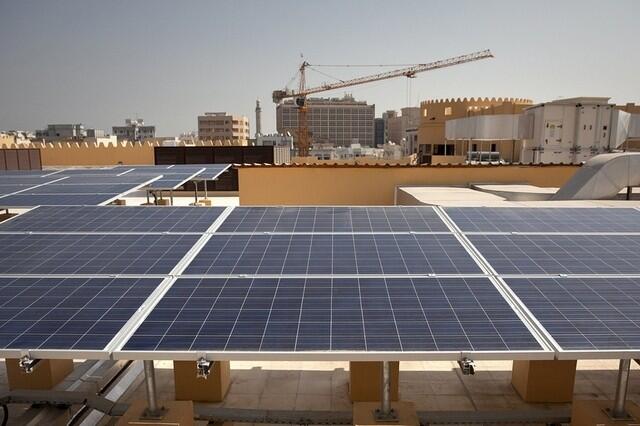Electricity tariffs in Abu Dhabi need to rise by more than two-thirds before investment in solar power becomes economically viable for businesses and homeowners as an alternative source of power to help reduce their bills.
This month, the Abu Dhabi Distribution Company announced new power and water tariffs for the emirate, with bills set to rise at the start of next year by more than 30 per cent for some users.
To cut the cost of electricity, other sources of power could be considered.
The UAE has large solar parks in operation or under construction, but smaller installations are still not yet feasible to help reduce the rising cost of electricity in Abu Dhabi.
“The [electricity] tariff for commercial and industrial customers, in spite of its recent change, doesn’t allow yet for such a commercial activity to develop,” said Laurent Longuet, the director of Siraj Power in Dubai.
Meanwhile, Abu Dhabi’s Regulation and Supervision Bureau (RSB) is working on regulations for small-scale solar, adding the energy source to residential and commercial buildings.
The authority said last week it was looking for feedback from parties involved in design, installation, maintenance and operation. “We encourage any interested parties … to communicate their views,” the RSB said.
The sun is helping to power more than 200 commercial and industrial buildings in Dubai, which has much higher power prices than Abu Dhabi.
The lowest-usage band of commercial users pay 44 fils per kilowatt hour (kWh) in Dubai, a 62 per cent premium to that of Abu Dhabi’s lowest usage band commercial rate of 27 fils. At the higher summer usage rates in Dubai’s tariffs for the commercial sector are at a 46 per cent premium over Abu Dhabi’s.
Jeremy Crane, the head of Dubai’s Yellow Door Energy, a solar financier and installer, said a return on investment was even further off for homeowners. “Still, in Dubai [with higher prices], very few residential customers are choosing solar for economic reasons,” he said.
To break this down, assume that a villa installs 20 solar panels on its roof – with total capacity of 5 kilowatt peak power – with the amount of electricity consumed running at 65,000 kWh per year.
In Dubai, the return on the solar system investment would be eight to nine years. Yet in Abu Dhabi, that payback is 10 to 11 years, which is only one year shorter than with the emirate’s previous tariffs.
“Even though Abu Dhabi’s ‘lower price tier’ increased by about 27 per cent, the ‘high price tier’ decreased by around 4.2 per cent – and this is why the effect isn’t that significant,” said Hennie Schoeman, the project manager for Dubai’s Oryx Solar.
“The higher the tariffs go, the better returns will be made on solar systems. A good payback period for residential systems would be around seven years, industrial systems around four or five years.”
The light industrial sector could more readily find an economic benefit from an investment in solar. Next year’s electricity rate for industrial consumers up to 1 megawatt is 28.6 fils per kWh – nearly 79 per cent higher than the previous tariff.
This has shortened the return on investment to five to six years, compared to a decade.
Incentives such as feed-in tariffs or even favourable financing from local banks could also cut the return on an investment timeline. Other issues remain for the viability of these smaller systems. “One of the main problems contractors face in the UAE is the time it takes to connect these systems to the grid.
If regulations ease up and the connection process is better defined, contractors will be able to offer residential clients much lower rates,” Mr Schoeman said.
Many communities in the UAE restrict solar systems to installations that are not visible, meaning sloped roofs are prohibited.
“This means that loads of villas aren’t suitable for solar or that panels need to be installed at less-than-optimal angles to remain hidden from view,” he said.
Source: The National











